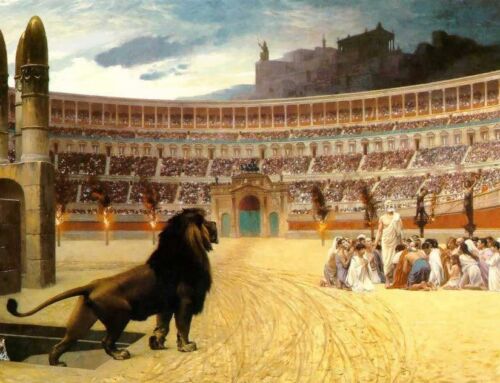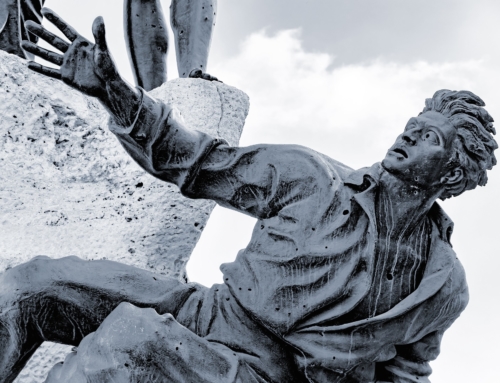One of my favorite spiritual writers is the 20th century German scholar, Romano Guardini (1885-1969). Don’t let his Italian-sounding name fool you. He was of Italian descent, but he grew up in Germany and had the penetrating intellect and organized mind of a German scholar.
Guardini was a Catholic priest, a pastor, and a university professor. It was his contact with “real people” that informed his many writings. To anyone interested in spiritual development, Guardini provides light for the journey, particularly in his most famous work on Jesus, simply titled, The Lord. Guardini finds a welcome home on a website dedicated to Truth, Beauty, and Goodness.
In his book, Learning the Virtues that Lead You to God, he writes about patience and presents an interesting view of it. He starts, not by instructing the reader on the practice of patience, as you would expect, but by talking about the patience of God.
The terrible alternative
We hardly appreciate how patient our God is with us and with the world He has created. But God loves His flawed creation with an eternal forbearance that no god of any pagan society ever expressed. Guardini notes:
An Indian myth tells of Shiva, who fashions all things: in an exuberance of delight, he creates the world, but then grows weary of it, treads it into fragments, and produces another. This suffers the same fate, and creating and destroying continue indefinitely. How impressive is the image of this divinity of impatience. It shows us how different is the relation of the true God to the world. (36)
What if our beloved Father in Heaven acted with such terrible caprice? No one would survive. But our God does not become weary with the disorder of the world or the sinfulness of man – thankfully. He is eternal patience.
Recall the Parable of the Weeds and the Wheat (Matthew 13:24-30). God allows good and evil to grow together in the world until “harvest time” – an image that is not difficult to interpret, especially when He mentions that the angels will be dispatched to gather up all the weeds and burn them at the end.
But God’s patience has a purpose: it is directed toward our salvation (2 Peter 3:15). He knows that those of His creatures who live in the flesh only grasp spiritual truths by much trial and error. Going down this learning curve, as we often call it, takes time.
Our practice of patience, then, must mirror God’s patience with the world, not only as we endure the faults and failing of others but, more importantly, as we endure our own.
Prerequisite for moral growth
Fr. Guardini says that we must strike a delicate moral balance in the patient project of working out our salvation:
Disgust with oneself: The greatest spirits have most often felt this. Here patience must again take over and help us to accept ourselves and to persevere. We are not to approve of that in ourselves which is not good; not to be self-satisfied – that would be the way of the Philistine. Dissatisfaction with our own imperfection and insufficiency must remain; otherwise, we would lose that power of self-criticism which is the prerequisite for all moral development. But it should not cause us to escape into illusions about ourselves. Every sound criticism must begin with what is given and work on from that point, knowing that it will be slow work, extremely slow. And this very slowness guarantees that the change is taking place not in our fancy, but in reality. (41)
In developing virtue, we cannot be dreamers or wishful thinkers. Patience keeps us in the realm of reality, which starts with a wholesome acceptance of the imperfect self and works toward self-mastery:
A real moral growth would take place if our acts of restraint and self-moderation became more conscious… and if we did not let ourselves be carried away so easily by the impulse of our feelings, but remained more free, and attained a mastery over our emotions and our inner selves. This would not be fantasy, but real processes of the interior life…. But that sort of thing takes place slowly, very slowly. (Ibid.)
One can hear echoes of the wise pastor in the next several insights, which were undoubtedly the substance of many sermons and confessions. Growth in virtue requires many new beginnings:
So he who wishes to advance must always begin again. He must constantly immerse himself in the inner source of life and arise therefrom in new freedom, in initiative – the power of the beginning – in order to make real what he has purposed: prudence, temperance, self-control, or whatever it may be that is to be accomplished. Patience with oneself – not carelessness or weakness, of course, but the sense of reality – is the foundation of all progress.
The salient point is that we can’t rush virtue’s development or take it by storm. It is gained by many efforts and many failures. We must come to terms with the fact that we cannot eradicate our faults overnight, or in some cases, ever.
Patience provides the foundation upon which we at least have a fighting chance to make progress in our inner development.
The cancer of impatience: Faust
This reminds me of the ‘70s commercial for Paul Masson wine, which featured the famous actor, Orson Welles, holding up a glass of Emerald Dry and announcing in his magnificent voice that “some things can’t be rushed”, such as good music and good wine. And then, staring into the camera: “We will sell no wine before its time.”
Guardini (who died in 1968) never saw that commercial! However, he would have easily taken it as a confirmation that a lack of patience can actually lead to disaster, in virtue as well as in viniculture. He notes that some people even end up losing their souls for lack of patience. I had never made that connection before.
Lack of patience is the adolescent refusal to undertake the long process of achieving important things by patient work. Like spoiled children, many people want everything of value handed to them on a silver platter – now. But not only is this impossible, it is the road to spiritual death. How so?
He cites the famous German Romantic story of Faust who made a bargain with Mephistopheles in order to gain worldly power and wealth. The main flaw of Faust, Guardini says, was not his greed (which was bad enough), but his narcissistic impatience:
Goethe’s Faust, who was formerly the idol of the bourgeoisie, is impatient through and through; he is a dreamer who never grows up. He sells himself to magic, a way of expressing that [shows] he does not know how definitely the basis of all growth and accomplishment is formed by the acceptance of reality, endurance, and perseverance amid the things that are. Instead, he makes speeches, [and] everything around him goes to pieces…. (42)
…including, as the story goes, his very soul, which he bargained away and could not buy back.
Strength for the journey
So we persevere. We continue to strive for self-mastery, despite our many failings. We patiently pick ourselves up and accept the reality of our existential poverty, our many faults and failings. God accepts our sinfulness and flawed nature with infinite patience. We owe it to Him to do the same, to keep trying to do His Will every day, placing one foot in front of the other in the grand project of making our way to Heaven.
That trying is itself a strength that serves us well on the journey. Guardini says, finally, that
Patience demands strength – great strength…. only the strong man can exercise living patience, can take upon himself again and again the things that are; only he can always begin anew. Patience without strength is mere passivity, dull acceptance, growing accustomed to being a mere thing. (43)
But we are not things, we are persons. So we come full circle to the moral message we were all taught in our youth: “Patience is a virtue.”
Yes, and a very necessary one!

Soul Work
How many times have you felt a sense of repugnance for your failures? That feeling may be a natural result of personal letdowns, but we should never let it reign in our hearts or control our responses to the problems of life. Patience urges us to get back up again and continue the work of soul development.
God has been patient with you for a reason. You be patient with yourself too, which means walking the tight rope between honest acceptance of faults and a healthy self-criticism which strives always for greater purity.
Be patient and merciful with yourself, in imitation of our loving Father, and it is just possible that you will become much more patient and merciful with others.
————
Source: Romano Guardini, Learning the Virtues that Lead You to God (Manchester, New Hampshire: Sophia Institute Press, 1987), 41-43. Used with permission. Kindly visit the Sophia Institute Press website for more information about this book and others.




This story reminds me of a cross stitch picture my Mother hung on the wall, it said “Dear Lord give me patience…….but please hurry lol. A lifelong journey for some of us
Your mother must have been a real gem!